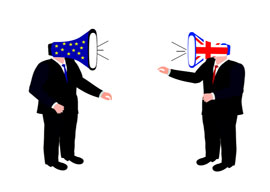
February 24, 2017

Source: Bigstock
Second, and this is important, while the word “Leave” is indeed unambiguous, the terms on which we should leave were never made explicit in the referendum campaign. Some certainly argued for a clean and complete breakaway. Others, however, held out the prospect of an exit from the E.U. that would nevertheless allow Britain to remain within the single market or the customs union. The so-called Norway and Swiss options were floated as alternatives to full membership, and some who voted “Leave” favored one or the other of them. Yet it appears that both have been ruled out by the prime minister, who was herself on the Remain side and is now preparing to enact something she opposed last June.
Third, the Leave camp was itself divided. Some on the Tory right are free traders and enthusiasts for globalization; others, particularly traditional Labour voters, take the clean opposite view. Those who were motivated to vote Leave because of their opposition to immigration are, like many Trump voters in America, hostile to the globalist agenda. They want protection. At present it looks unlikely that they will get it. The form Brexit takes will disappoint them, even to such an extent that they will regret their vote.
Fourth, Blair drew attention to the implications of a hard Brexit for the future of the United Kingdom itself. He is a unionist and wants the U.K. to survive. But he recognizes that the form Brexit takes may lead to its break-up. As the final architect of the Northern Ireland Peace Settlement, he recognizes that the reemergence of a hard border between the North and the Republic would likely disrupt that settlement and lead to the resurgence of Irish nationalism in the North, even of a return to the Troubles. He also thinks Brexit will weaken the already fragile commitment to the union in Scotland and strengthen their Scottish National Party. In this he is surely right. The economic case for Scottish independence is weaker than it was at the time of the 2014 Scottish referendum, but the political case for independence is now stronger. Sixty-two percent of those who voted in Scotland last June voted to remain in the E.U.”a much more handsome majority than the narrow Leave majority in the U.K. as a whole. But these Scots Remainers are now being ignored, their wishes disregarded, and, depending on how Brexit works out, a fair number of them are likely to be inclined to vote for independence. Membership of a United Kingdom within the E.U. is one thing, union with Little England something very different and much less attractive.
I was never a fan of Tony Blair, but I welcome his intervention in the current debate. It is public-spirited and, given his battered reputation, courageous. It’s too late to stop Brexit, but it’s not too late to try to temper the terms of Brexit, to check the march toward a hard Brexit, a Brexit that is selfish and, to my mind, stupid and damaging. As for me, I”m Scottish, British, and European. I don”t want to have to choose between these identities, but if Brexit takes the form that now seems likely, then it’s the British identity I will be inclined to let go.